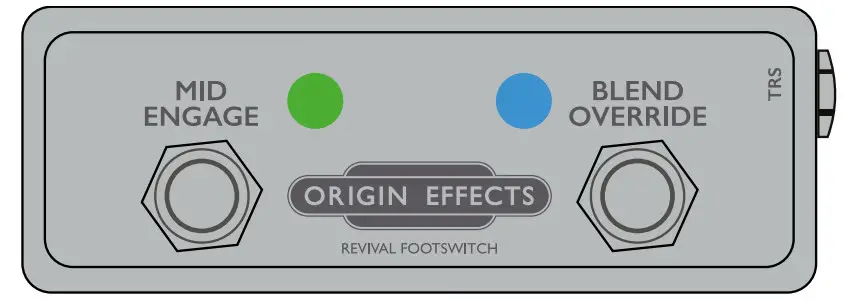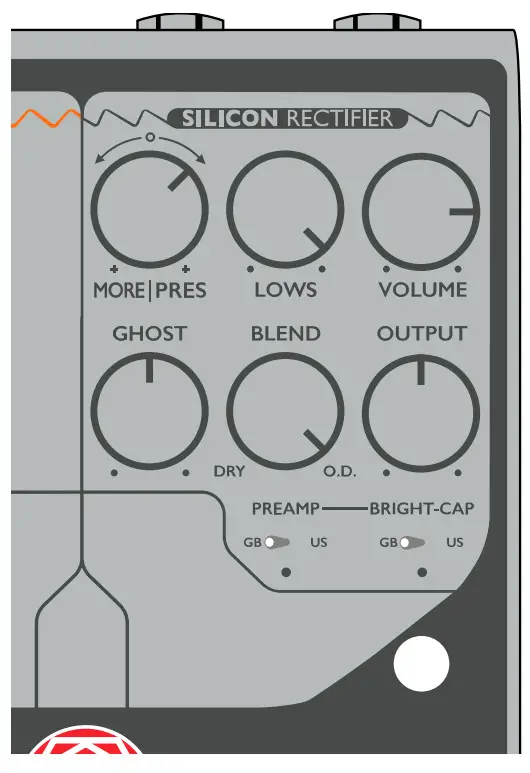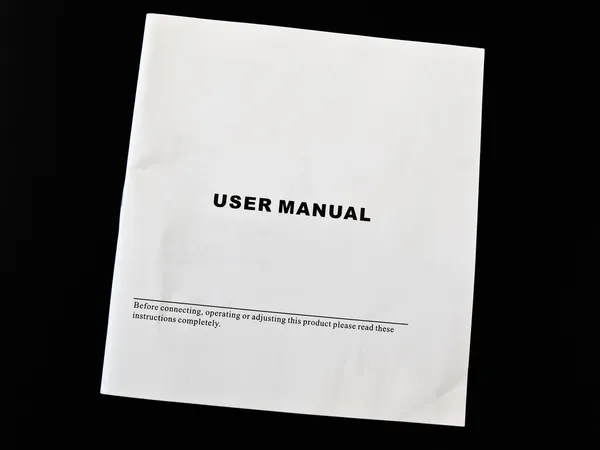 www.origineffects.comOWNER’S MANUAL
www.origineffects.comOWNER’S MANUAL

Origin Effects®, Cali76 ®, SlideRIG ®, and RevivalDRIVE ® are all registered trademarks.All other product names and trademarks are the property of their respective owners and are hereby acknowledged.No part of this publication may be reproduced in any form or by any means, whether mechanical or electronic, without the written permission of Origin Effects Limited.Origin Effects Limited reserves the right to change the features and specifications described herein without notice or obligation. Origin Effects Limited cannot be held responsible for any loss or damage arising directly or indirectly from any error or omission in this manual.PLEASE READ ALL INSTRUCTIONS, PAY SPECIAL ATTENTION TO SAFETY WARNINGS.Document version 1.1© Origin Effects Limited 2021
IMPORTANT:This product is designed to be powered from a 9VDC, >120mA power supply with a 2.1mm center negative barrel connector.The voltage is boosted internally for optimized headroom. Powering from more than 9V will not increase headroom further and may cause damage if connected for prolonged periods of time. Do not exceed 18V.An isolated, regulated, linear power supply is recommended to minimize power-related noise and avoid damage from voltage surges and other over-voltage conditions.
Welcome to the RevivalDRIVE Hot Rod
From searing lead tones to super-saturated chords and palm-muted riffs, the RevivalDRIVE Hot Rod delivers two channels of aggressive high-gain.This super-charged version of our celebrated RevivalDRIVE pedal is designed to deliver massive amounts of overdrive and sustain, by paying homage to the heavily modified amps that came to define the sound of hard rock and heavy metal.In developing the RevivalDRIVE Hot Rod, we analyzed the most influential amp mods and altered the RevivalDRIVE’s signal path to create a range of hot-rodded tones worthy of the greatest rock gods.Using all-analog components and replacing the valves with discrete transistor-based circuitry, we have reproduced the sound and circuit behavior of these “hot rods”, all in a fully variable and controllable way. This means that you can use the RevivalDRIVE Hot Rod to nail the sound of a particular amp or recording, or you can mix and match the various properties of different amps to create your own sound. At the same time, the RevivalDRIVE Hot Rod incorporates a range of controls that will tailor its response tosuit the amp you’re plugging into. Unlike the vast majority of overdrive pedals, the RevivalDRIVE Hot Rod is genuinely designed to sound fantastic with any amp.With tons of tweak ability, including a fully adjustable mid boost, dry blend controls, and the unique GHOST feature, the RevivalDRIVE Hot Rod is a fairly complex device. We invite you to read through this manual so you can gain a full understanding of all it can do. But if you can’t wait, by all means, skip ahead to the Sample Settings on page 14 and start playing!
 Simon KeatsDesigner and Origin Effects founder
Simon KeatsDesigner and Origin Effects founder
Connecting the RevivalDRIVE Hot Rod
INSTR input: Connect to your guitar, bass or another instrument.AMP output: Connect to your amp, power amp, mixer, or recording interface.9VDC input: Connect a 9VDC 2.1mm center-negative mains power supply which can provide at least 120mA.F/SWITCH input: Connect the Revival Footswitch (sold separately).
 Operating the Pedal
Operating the Pedal
ON footswitch: Toggles between BYPASS (“off”) and EFFECT (“on”) modes.O/O channel footswitch: Toggles between the VALVE RECTIFIER and SILICON RECTIFIER channels.Channel indicator LEDs: The currently selected channel is indicated by the VALVE RECTIFIER (orange) and SILICON RECTIFIER (white) LEDs. These remain active when the effect is bypassed.Jewel light: The central jewel lamp will illuminate when the effect is engaged. Because it’s directly connected to the power supply, the lamp will dim as the power amp “sags”, just like the jewel lamp on a vintage amp.

Suggested Connection Settings
Plugging into a guitar amp, bass amp or amp modeler
RE-AMP EQ: Select EQ1 (for brighter sounding amps) or EQ2 (for darker sounding amps) on the RE-AMP EQ switch. Use the HI SHELF boost/cut control and BRI-CAP CUT filter to adjust for the high-frequency response of your amp.Note that in the case of the “Custom” model, switching to the EQ2 setting enables the custom panel controls, which offer compatibility with bright and dark amps alike. Please see Custom Panel Controls: “RevivalDRIVE Hot Rod CUSTOM” on page 11 for more information.

Plugging into a flat-response power amp, recording interface or mixer DI
RE-AMP EQ: Select PWR AMP on the RE-AMP EQ switch and use the HI SHELF boost/cut control to fine-tune the high-frequency response. Set the BRI-CAP CUT filter control fully counter-clockwise (no treble roll-off).MODE DIP switch: On the rear of the pedal, set switch 1 on the MODE DIP switch to the upward position. When the RevivalDRIVE Hot Rod is in BYPASS mode, your input signal will still pass through the preamp EQ filters.

Please note that a cabinet simulator will be required for DI applications where the signal is to be reproduced via a full-range speaker system.
Valve & Silicon Rectifier Channel Controls
The RevivalDRIVE Hot Rod features two channels, selectable via footswitch. While the controls are identical, the two channels offer a choice of rectifier styles.Please note: the VALVE RECTIFIER channel can be switched to a second SILICON RECTIFIER channel using the rear-panel MODE DIP switch. See Mode DIP Switch on page 12 for more information.

VOLUME: In true vintage amp style, we’ve gone with the term “VOLUME”, but we could equally have called this control “gain”. Turn clockwise for more overdrive, counter-clockwise to clean things up.LOWS: Having set the desired treble response using the PREAMP switch, the LOWS control allows you to adjust the amount of bass pushing the drive circuitry.OUTPUT: Sets the overall output level of the channel. Adjust the VOLUME and OUTPUT controls to achieve the desired combination of distortion and level.BLEND: This control lets you adjust the mix between the dry input signal (DRY) and the overdriven signal created by the RevivalDRIVE Hot Rod (O.D.). From 100% O.D. when the control is turned fully clockwise, you can progressively mix your original clean tone back in to add more clarity and definition by turning the control counter-clockwise.Please see notes on the DRY GAIN Control on page 10 and the BLEND OVERRIDE function under Revival Footswitch on page 13 for more on this control.
MORE/PRES: This control combines two parameters, both related to the effects of negative feedback in the power amp stage.PRES (turn clockwise): The classic “Presence” knob, the PRES control releases the higher frequencies from the effects of negative feedback as you turn it clockwise from the center position. This has the effect of progressively boosting higher frequencies in vintage Marshall and Trainwreck fashion.MORE (turn counter-clockwise): The MORE control progressively reduces negative feedback in the pedal’s output stage, increasing gain but also varying playing feel by modifying the clean-to overdriven transition characteristics.With the control center at 12 o’clock, there is a definite threshold to this transition, with an abrupt switch from clean to overdriven once you pick hard enough. Turning the control fully counterclockwise completely removes negative feedback, delivering maximum gain, early onset of distortion and a smooth, gradual transition from clean to fully overdriven. It will also slightly increase the amount of background hiss, which would otherwise be counteracted by negative feedback.In general terms, the response at 12 o’clock is akin to a Marshall with the “Presence” knob at zero. Turn the knob fully counter-clockwise and the pedal behaves like a Vox AC30, with no negative feedback whatsoever. In between, you’ll find Fender Blackface territory.Please refer to the Sample Settings on page 14 to learn how to set this control to match the performance of your favorite style of the amp.GHOST: This control lets you introduce “ghost tones” by varying the amount of capacitance in the pedal’s virtual amp-style power supply. Turn clockwise to lower capacitance and create more of the ghosting effect. The GHOST control also affects power amp sag onset and recovery timing – how quickly the output level drops and then returns to normal when hit with a loud note. This is more noticeable when using the VALVE RECTIFIER channel. Turned fully clockwise (lower capacitance), the transition in and out of the sag is almost immediate. Turned fully counterclockwise (higher capacitance), the onset and recovery times are at their slowest.In general, faster transition times will allow the pedal to sag in response to the individual notes contained in a musical passage, as the power supply has time to recover in the pauses between notes. However, too fast and you may struggle to hear the rapid onset of sagging. Slower transition times will tend to sag across entire passages of notes, which can also be less noticeable. Setting the GHOST control between these two extremes results in a “spongey” playing feel.
PREAMP: The PREAMP switch offers three hot-rodded amp tone shapes.
 Centre position: A less extreme tone shape – almost flat but with a subtle treble lift. Overall, this position is warm and round.GB (switch left): Modelled after a ‘70s master volume Marshall – treble and mid-tone controls set full, with the bass set very low. This equates to a tone rich in mids, with a tight, “mush-free” bass.US (switch right): Applies a similar approach to a modified Fender amp for a cutting, bright tone.
Centre position: A less extreme tone shape – almost flat but with a subtle treble lift. Overall, this position is warm and round.GB (switch left): Modelled after a ‘70s master volume Marshall – treble and mid-tone controls set full, with the bass set very low. This equates to a tone rich in mids, with a tight, “mush-free” bass.US (switch right): Applies a similar approach to a modified Fender amp for a cutting, bright tone.
BRIGHT-CAP: This switch connects a capacitor to the VOLUME control, allowing high frequencies to sidestep any attenuation in exactly the same way as the “Bright” switch found on many Fender amps or using a Marshall’s bright channel.



Mid Boost Controls
The RevivalDRIVE Hot Rod features a powerful mid-range boost that can be used to modify the overdriven tone or provide a solo boost to help you cut through the mix. Fully variable in both level and center frequency, the MID BOOST can be applied to either channel or remotely activated using the optional footswitch.


MID ASSIGN: This three-way switch applies the MID BOOST to either the VALVE RECTIFIER channel (switch left) or the SILICON RECTIFIER CHANNEL (switch right). With the switch in the central, F/SWITCH position, the MID BOOST is deactivated but can be switched in at any time using the optional footswitch.Please note: in F/SWITCH mode, the MID BOOST is applied to both the DRY and O.D. signals when activated. In all cases, the MID BOOST is not active when the pedal is in BYPASS mode.MID LEVEL: Sets the level of the MID BOOST, from +2dB to +8.5dB.MID FREQ: Sets the center frequency of the MID BOOST, ranging from 800Hz to 2kHz.
DRY GAIN Control
The DRY GAIN trimmer adjusts the level of the DRY signal that is mixed with the O.D. signal using each channel’s BLEND control.Since the pedal’s overdrive circuitry can introduce considerable additional gain, the DRY GAIN control allows you to effectively balance the relative levels of the DRY and O.D. signals when using the BLEND control and the foot-switchable BLEND OVERRIDE function (see FOOTSWITCH below). Please note: the DRY GAIN control is not active when the pedal is in BYPASS mode.


Re-amp EQ Controls
The RE-AMP EQ ensures compatibility with a wide range of amplifiers. Instead of altering your amp tone controls to suit the RevivalDRIVE Hot Rod, set your amp for the desired clean sound then use the RE-AMP EQ controls to adjust the RevivalDRIVE Hot Rod’s output accordingly.


RE-AMP EQ switch: The RE-AMP EQ switch offers a choice of three different output filters.PWR AMP: Use this setting when plugging into a flat-response power amp. This EQ is set more or less flat, with a subtle bass boost applied after the overdrive circuit to imitate the resonant loading of the speaker in a guitar amp.EQ1: Designed to suit the response of a Blackface Fender amp, EQ1 applies a low-pass filter to roll off excessive highs. Use this setting when plugging into a bright-voiced guitar amp.EQ2: Voiced for a Marshall amp with the channels bridged, EQ2 sits between the other two, applying a high shelf cut to gently rein in high frequencies.With the additional front-mounted filter controls on the RevivalDRIVE Hot Rod CUSTOM, the EQ2 position on the standard RevivalDRIVE Hot Rod gives way to a highly tweakable custom filter, designed to deliver universal compatibility for most mainstream guitar amplifiers.See Custom Panel Controls: “RevivalDRIVE Hot Rod CUSTOM” below for more information.HI SHELF: A fairly conservatively voiced treble boost/cut control for making small adjustments to the high-frequency component of your tone. In particular, it’s designed to counteract Fender-style treble tone controls. This shelving filter provides up to +/-6dB. Starting from 12 o’clock (no boost or cut), turn counterclockwise to tame highs if your amp sounds too bright, or turn clockwise to boost highs on a dark-sounding amp.BRI-CAP CUT: This low-pass/high-cut filter is designed to compensate for the tonal effects of the “Bright Cap” (if any) wired to the host amplifier’s volume control, which can lead to a very bright and harsh sound when fed by an overdrive pedal. In the fully counter-clockwise position, the BRI-CAP CUT control has no effect. Turn clockwise to progressively cut more highs. For best results, the BRI-CAP CUT trimmer should be adjusted whenever you make significant changes to your amp’s volume settings.
Custom Panel Controls: “RevivalDRIVE Hot Rod CUSTOM”
Working in tandem with the RE-AMP EQ controls on top of the RevivalDRIVE Hot Rod (see above), the RevivalDRIVE Hot Rod CUSTOM’s Custom Panel controls provide additional options to fine-tune the pedal’s output to the response of your chosen amp.SHELF FREQ: This three-way toggle switch varies the shelf frequency of the HI SHELF filter trimpot on top of the pedal, allowing greater flexibility.CUT FREQ: Varies the low-pass frequency of the BRI-CAP CUT filter trimpot on top of the pedal, for optimal compatibility with all vintage Fender and Marshall amps.


The SHELF FREQ and CUT FREQ controls are active in all RE-AMP EQ switch positions.To activate the ADJ, FREQ, and MODE controls set the RE-AMP EQ switch on top of the pedal to the central EQ2 position.ADJ: Turn clockwise to reduce treble and boost the bass, and counter-clockwise to increase treble and reduce bass.FREQ: This three-way switch shifts the frequency focus of the EQ up or down.MODE: Select MODE I when using a full-range amp that sounds wooly or muddy. Select MODE II when addressing an overly bright amp that needs taming.
Mode DIP Switch
Located on the rear panel, the MODE DIP switch controls the following settings.


- DRY/BYPASS DIP SWITCH: This switch is only active when the REAMP switch is set to the PWR AMP position. With PWR AMP selected, the DRY/BYPASS DIP switch modifies the BYPASS and DRY signal path to incorporate the pedal’s PREAMP circuitry.In bypass, with switch 1 in the downward position, the signal present at the input connector is routed to the pedal’s output via a high-quality buffer. With the pedal engaged, any blended DRY component is fed from the same buffer. Use this setting when plugging into a guitar amp.When plugging into a flat-response power amp, move the switch to the upward position. When the pedal is bypassed, the input signal now passes through the preamp filter stage, controlled by the PREAMP switch on the currently active channel. This means you can still take advantage of the RevivalDRIVE Hot Rod’s classic amp-style tone shaping, even when not using the main overdrive circuit. The pedal’s two channels remain switchable even in BYPASS mode, allowing you to set up two distinct tones.
- RECTIFIER DIP SWITCH: Move switch 2 to the up position to transform the VALVE RECTIFIER channelinto a second SILICON RECTIFIER channel.
- GHOSTING DIP SWITCH: Switch 3 toggles between 50Hz/British (switch down) and 60Hz/USA (switch up) simulated mains frequencies, subtly altering the pitch of the ghost tones generated.
Revival Footswitch
Connecting the Revival Footswitch (sold separately) to the F/SWITCH input at the rear of the pedal provides two further functions.


MID-ENGAGE: With the pedal’s MID ASSIGN switch set to F/SWITCH, this allows you to apply the adjustable mid boost to whichever channel is currently selected.Please note: the MID BOOST is applied to both the DRY and O.D. signals mixed by the BLEND control. The MID BOOST function is not active when the pedal is in BYPASS mode.BLEND OVERRIDE: This footswitch “overrides” or removes each channel’s BLEND control from the signal path. With the BLEND knob set for a mix of DRY and O.D. signals, engaging the BLEND OVERRIDE effectively removes the DRY component and reverts to a 100% O.D. signal.This offers additional flexibility akin to having another channel on your amp. For example, with the channel controls set for medium gain and the BLEND knob at 12 o’clock, engaging the BLEND OVERRIDE footswitch lets you go from an organic clean tone with a little grit to a fully overdriven sound for solos.By carefully adjusting the DRY GAIN trimmer, you can control the change in volume – up, down or unity gain – that occurs when engaging BLEND OVERRIDE. For example, you could set up your core drive tone with BLEND OVERRIDE engaged, then transition to a cleaner sound of equal or greater volume by disengaging BLEND OVERRIDE and turning the DRY GAIN control up.
Sample Settings


Princeton BoogieValve rectifier channelInspired by the lead tones of Santana’s modded Fender Princeton, these settings deliver a controlled, mid-focused overdrive sound. In the late 60s, Randall Smith was hot-rodding Fender Princeton combos for more gain and sustain. This venture later turned into MESA/Boogie.Step into Boogie MK1 territory by transforming the spongey simulated valve rectifier channel into a harder-sounding silicon rectifier using MODE DIP switch 2.



Hot Rod PlexiSilicon rectifier channelExperience the soaring lead tones of a late 70s Plexi modded with cascaded gain stages.We’ve replicated the response of an early master volume Marshall, a predecessor to the much loved JCM800 series.‘Snip’ the bright cap by moving the BRIGHT CAP switch to the center position, further modifying your tone.


Orange SquashValve rectifier channelMax out the VOLUME control with these settings for pure power amp explosion! A powerful sound reminiscent of a wall of cranked Orange stacks.The sagging power stage in conjunction with the simulated valve rectifier compresses each note and adds harmonic complexity to sustained chords.
Liverpool Hot RodSilicon rectifier channelLike an AC30 on steroids! We’ve voiced this setting after the well-respected Trainwreck Liverpool amps which pushed the British EL84 design to the limit.These settings provide a glassy lead tone with ultra-sensitive dynamics. Assign some MID BOOST to the SILICON RECTIFIER channel to fatten up the sound of single-coil pickups.



Appendices
Appendix A: physical specificationRevivalDRIVE Hot Rod:
| Unboxed | Boxed | |||
| Weight | 1200g | 42oz | 1450g | 51oz |
| Length | 160mm | 6 5/16″ | 190mm | 7 8/16″ |
| Depth | 117mm | 4 10/16″ | 180mm | 7″ |
| Height | 59mm | 2 5/16″ | 95mm | 3 11/16″ |
RevivalDRIVE Hot Rod CUSTOM:
| Unboxed | Boxed | |||
| Weight | 1250g | 44oz | 1500g | 53oz |
| Length | 165mm | 6 8/16″ | 190mm | 7 8/16″ |
| Depth | 117mm | 4 10/16″ | 180mm | 7″ |
| Height | 59mm | 2 5/16″ | 95mm | 3 11/16″ |
Appendix B: performance specification
| Measurement | Value |
| Input impedance | 1M 0 |
| Output impedance | 1k 0 |
| Current draw | 120mA |
| Power supply requirements | 9V 2.1mm center negative adapter |
Appendix C: connector pinouts
Footswitch 1/4” jack socket:
| Pin | Description |
| Tip | MID BOOST |
| Ring | BLEND OVERRIDE |
| Sleeve | Ground |
Appendix D: safety notices
General safetyKeep these instructions and heed all warnings. Do not use this apparatus near water. Clean only with a dry cloth. Do not install near any heat sources such as radiators, heat registers, stoves or other apparatus (including amplifiers) that produce heat. Refer all servicing to qualified service personnel. No user-serviceable parts inside.When using an external power supply, use only attachments/accessories specified by Origin Effects.Protect the power cord from being walked on or pinched particularly at plugs, convenience receptacles, and the point where they exit from the apparatus. Do not defeat the safety purpose of the polarised or grounding-type plug. A polarised plug has two blades with one wider than the other. A grounding-type plug has two blades and a third grounding prong. The wide blade or the third prong are provided for your safety.If the provided plug does not fit into your outlet, consult an electrician for the replacement of the obsolete outlet. Unplug this apparatus during lightning storms or when unused for long periods of time.WARNING: Any changes or modifications not expressly approved by Origin Effects Limited could void the user’s authority to operate the equipment.
RoHS

![]()
![]()
The crossed-out wheely bin symbol indicates this product is classified as Waste Electrical and Electronic Equipment (WEEE) in the European Union and should not be discarded with household waste. Other territories may vary. Contact your local authority or Origin Effects for more information.


![]()
![]()
![]()
![]()
Appendix E: warranty
This product is covered by a 2-year manufacturer’s warranty from the date of purchase. This applies only to original purchasers who have bought their product from an authorized Origin Effects dealer or directly from Origin Effects.All returns or servicing should be arranged through the original dealer. Proof of original ownership may be required in the form of a purchase receipt.For full warranty details visit www.origineffects.com/warranty.
About Origin Effects
Origin Effects is the brainchild of Simon Keats, a guitarist, an electronic engineer, and an analog circuit designer who has worked for the likes of Vox, Focusrite, and Trident Audio. Having built bespoke effects for professional musicians and producers for many years, he launched the Origin Effects brand in 2012 to bring his exceptional designs to a wider audience.His first two pedals – the Cali76 compressor and the unique SlideRig dual-chained compressor – were soon followed by the Compact Series of compressors for guitar and bass. Widely recognized as some of the best pedal compressors ever made, they have found favor with guitarists and bass players like David Gilmour, Pino Palladino and John Mayer, as well as Grammy Award-winning producers like Paul Epworth, Ross Hogarth, and Terry Britten.In 2018, Origin began a new chapter with the launch of the RevivalDRIVE, a groundbreaking overdrive pedal that recreates the circuit topology, sound, and response of a cranked non-master-volume valve amp. www.origineffects.com
References
[xyz-ips snippet=”download-snippet”]


